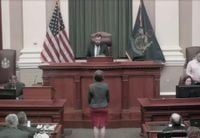PORTLAND, Maine – Republican Representative Laurel Libby is taking her battle to restore her voting privileges in the Maine House of Representatives to the U.S. Supreme Court. Following a recent ruling from the 1st U.S. Circuit Court of Appeals that denied her request for an expedited appeal, Libby filed an emergency application on April 28, 2025, seeking immediate intervention from the highest court in the land.
Libby’s predicament stems from her censure by the Maine House in February 2025, where a party-line vote of 75-70 prevented her from speaking or voting on the House floor. The censure was a response to a controversial social media post in which she publicly targeted a minor transgender athlete, sharing the student’s name and photograph in a critique of the state’s policies regarding transgender athletes competing in girls’ sports.
In her application to the Supreme Court, Libby expressed frustration over the impact of the censure on her constituents. “For over 60 days, my constituents have had no say in actions taken by their government, actions that directly impact their lives,” she stated in a press release. “Every vote taken on the floor of the legislature is a vote my constituents cannot get back. The good people of our district have been silenced and disenfranchised.”
The incident has drawn significant national attention, particularly after former President Donald Trump threatened to withhold federal funding to Maine over its transgender policies. His administration argued that these policies violated federal anti-discrimination protections, leading to funding cuts and a lawsuit by the U.S. Department of Justice against the state.
Libby’s legal team argues that the censure violates her First Amendment rights, claiming it suppresses her ability to represent her constituents effectively. In her lawsuit against Maine House Speaker Ryan Fecteau and House Clerk Robert Hunt, Libby contends that the sanction disenfranchises voters by depriving them of legislative representation. “The member’s vote is not her own; it belongs to her district,” her attorneys wrote in the appeal. “Depriving an entire district of representation is no more constitutional than excluding that district from a redistricting plan.”
Despite the censure, Libby has remained steadfast in her refusal to apologize for her post, which she argues was intended to highlight what she views as unfair competition in high school athletics. The post specifically criticized the Maine Principals’ Association for allowing transgender girls to compete in girls’ sports, a policy Libby vehemently opposes.
Justice Melissa DuBois of the U.S. District Court for the District of Maine denied Libby’s request for a preliminary injunction against the censure on April 18, 2025. In her ruling, DuBois acknowledged that while the ability to suspend an elected representative’s privileges is a serious matter, it ultimately reflects the will of the majority of House members. “This sanction is not of such extraordinary character as to obliterate the formidable shield the courts have provided to legislative acts,” DuBois stated.
Libby’s case is notable not only for its legal implications but also for its rarity; there have only been four censures in the Maine Legislature since 1820, and three of those have occurred in the past year and a half under Democratic leadership. The first censure in Maine was issued to an independent lawmaker in 2001.
In her ongoing legal battle, Libby is asking the Supreme Court for a swift response by May 6, 2025, when the Maine House is scheduled to convene for another session. Her team argues that the censure is a unique punishment that has no precedent in Maine’s legislative history. “That refusal to count a duly elected legislator’s vote is unprecedented in Maine,” the application asserts. “No other legislator has had his or her vote not counted as punishment, let alone for the rest of his or her elected term.”
Libby’s social media post, which sparked the censure, included the names and photographs of student athletes, which she used to criticize the state’s policy. Following the uproar, an increased police presence was reported at Greely High School, the institution attended by the transgender athlete featured in Libby’s post.
Speaker Fecteau, responding to the censure, emphasized the ethical responsibilities of legislators to protect the safety and privacy of minors. “Sharing images of kids online without their consent is a clear violation of the bond of trust and respect between citizens and their legislators,” he stated. “There is a time and place for policy debates. That time and place will never be a social media post attacking a Maine student.”
In her lawsuit, Libby argues that publicly available information about state championship results and athlete participation was already accessible online, claiming that her post did not pose any threat to the student’s safety. “The complaint that Rep. Libby’s speech somehow threatened child safety is irreconcilable with the fact that her speech addresses what occurred at a public competition with publicly available photos already on the internet,” the lawsuit asserts.
As the legal proceedings unfold, the implications of Libby’s case extend beyond her own political future, touching on broader issues of free speech, representation, and the rights of transgender individuals in sports. The outcome of her appeal may set a significant precedent regarding the limits of legislative discipline and the protections afforded to elected officials in their capacity as representatives of the public.
Libby’s ongoing fight highlights the contentious nature of the debate surrounding transgender rights in sports, a topic that has polarized opinions across the nation. With her eyes set on the Supreme Court, the stakes are high for Libby, her constituents, and the ongoing discourse on gender and sports in America.






